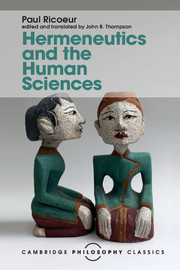Book contents
- Frontmatter
- Contents
- Preface to this edition
- Acknowledgements
- Editor's introduction
- Notes on editing and translating
- A response by Paul Ricoeur
- Part I Studies in the history of hermeneutics
- Part II Studies in the theory of interpretation
- 4 The hermeneutical function of distanciation
- 5 What is a text? Explanation and understanding
- 6 Metaphor and the central problem of hermeneutics
- 7 Appropriation
- Part III Studies in the philosophy of social science
- Select bibliography
- Index
4 - The hermeneutical function of distanciation
from Part II - Studies in the theory of interpretation
Published online by Cambridge University Press: 05 July 2016
- Frontmatter
- Contents
- Preface to this edition
- Acknowledgements
- Editor's introduction
- Notes on editing and translating
- A response by Paul Ricoeur
- Part I Studies in the history of hermeneutics
- Part II Studies in the theory of interpretation
- 4 The hermeneutical function of distanciation
- 5 What is a text? Explanation and understanding
- 6 Metaphor and the central problem of hermeneutics
- 7 Appropriation
- Part III Studies in the philosophy of social science
- Select bibliography
- Index
Summary
In previous studies, I have described the background against which I shall try to elaborate the hermeneutical problem in a way that will be significant for the dialogue between hermeneutics and the semiological and exegetical disciplines. The description has led us to an antinomy which seems to me to be the mainspring of Gadamer's work, namely the opposition between alienating distanciation and belonging. This opposition is an antinomy because it establishes an untenable alternative: on the one hand, alienating distanciation is the attitude that renders possible the objectification which reigns in the human sciences; but on the other hand, this distanciation, which is the condition of the scientific status of the sciences, is at the same time the fall that destroys the fundamental and primordial relation whereby we belong to and participate in the historical reality which we claim to construct as an object. Whence the alternative underlying the very title of Gadamer's work Truth and Method: either we adopt the methodological attitude and lose the ontological density of the reality we study, or we adopt the attitude of truth and must then renounce the objectivity of the human sciences.
My own reflection stems from a rejection of this alternative and an attempt to overcome it. The first expression of this attempt consists in the choice of a dominant problematic which seems to me to escape from the alternative between alienating distanciation and participatory belonging. The dominant problematic is that of the text, which reintroduces a positive and, if I may say so, productive notion of distanciation. In my view, the text is much more than a particular case of intersubjective communication: it is the paradigm of distanciation in communication. As such, it displays a fundamental characteristic of the very historicity of human experience, namely that it is communication in and through distance.
In what follows, I shall elaborate the notion of the text in view of that to which it testifies, the positive and productive function of distanciation at the heart of the historicity of human experience.
- Type
- Chapter
- Information
- Hermeneutics and the Human SciencesEssays on Language, Action and Interpretation, pp. 93 - 106Publisher: Cambridge University PressPrint publication year: 2016
- 6
- Cited by



